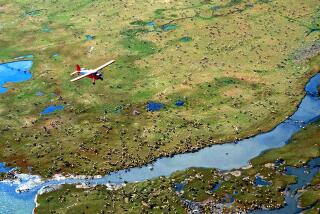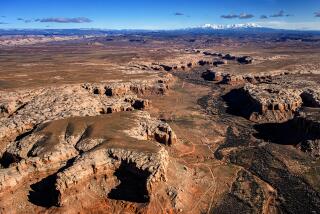ENVIRONMENT : British Columbia Opts for Wilderness Over Job-Rich Mine
- Share via
VANCOUVER, Canada — Environmentalists are applauding the creation of a remote wilderness preserve in British Columbia, linking Canadian and American parks to form what may be the world’s largest protected area.
The Tatshenshini and Alsek Wilderness Park, a 2.5-million-acre tract that is twice the size of the Grand Canyon, will provide an essential link between two national parks in Alaska and one in the Yukon Territory to create a 21-million-acre wilderness.
The triangular watersheds of the untamed Tatshenshini and Alsek rivers form a corridor that includes some of the highest coastal mountains in North America and some of the largest non-polar ice sheets on the planet.
The Tatshenshini flows 160 miles from the subarctic Yukon forest through a verdant landscape of alpine meadows surrounded by ice-blue glaciers and craggy peaks to empty into the Gulf of Alaska, offering a river-rafting adventure beyond compare.
In its lower reaches, glaciers descend into the river, thunderously shearing off icebergs. The area is also an important habitat for threatened and endangered species, including grizzly, black and the elusive silver-blue glacier bears. There also are Dall sheep and five varieties of Pacific salmon; the tract reportedly contains one of the globe’s largest concentrations of eagles.
Flanked by Alaska’s Glacier Bay and Wrangell-St. Elias national parks and Canada’s Kluane National Park Reserve in the Yukon, the Tatshenshini will be nominated for a World Heritage Site designation under the United Nation’s World Heritage Program.
The decision to preserve the Tatshenshini killed a huge proposed open-pit copper and gold mine, which proponents said would be worth as much as $8.5 billion and would have provided many jobs. Opponents, however, said it would have caused widespread pollution.
Analysts said the decision to create the giant preserve allowed the provincial government to exert damage control and recover moral ground lost when it sacrificed another significant natural attraction, the Clayoquot Sound rain forest, to the chain saw.
“We came to the conclusion that the preservation of wilderness and the proposed mining activities could not coexist,” British Columbia’s Premier Michael Harcourt said, referring to a key environmental impact study by a provincial commission on the Tatshenshini preserve. The report said that, if the mine had been allowed, acid runoff from it could despoil huge areas, including nearby Alaskan salmon grounds.
That prospect had deeply concerned U.S. Vice President Al Gore, who last December had focused attention on the Tatshenshini. His comments on the issue were seen as instrumental in defeating the proposed mine. In a statement this week, Gore called the decision to create the preserve “critically important.”
Tatshenshini Wild, the environmental group established four years ago to spearhead the fight to preserve the river, praised the decision. “We applaud the government for its courage,” said spokeswoman Dona Reel. “It’s a wonderful gift for all generations to come.”
American Rivers, a Washington-based conservation group, hailed the decision as “one of the greatest conservation victories of this century.” Alaska Program Director Thomas Cassidy Jr. said, “It is rare to have a decisive victory against such an immense and devastating threat.”
Adriane Carr, Western Canada Wilderness Committee spokeswoman, said that public disapproval of the recent decision to log the Clayoquot rain forest caught the government off guard and influenced the decision to preserve Tatshenshini. “The government underestimated public support for wilderness protection,” she said.
The decision left the mining industry steaming and vowing to quit the province. Royal Oaks Mines Ltd., which holds the controlling interest in the doomed mine, will seek “several hundred million dollars in compensation,” said Ross Burns, a spokesman, who added that the company would “steer clear of British Columbia from now on.”
Wayne Spilsbury, a Canadian mining industry representative, was quoted as saying the environmentalists’ victory would cost the region 2,500 construction and mining jobs. “A thousand people a year go up there. Who are they? They’re rich Americans,” he said.
More to Read
Sign up for Essential California
The most important California stories and recommendations in your inbox every morning.
You may occasionally receive promotional content from the Los Angeles Times.










